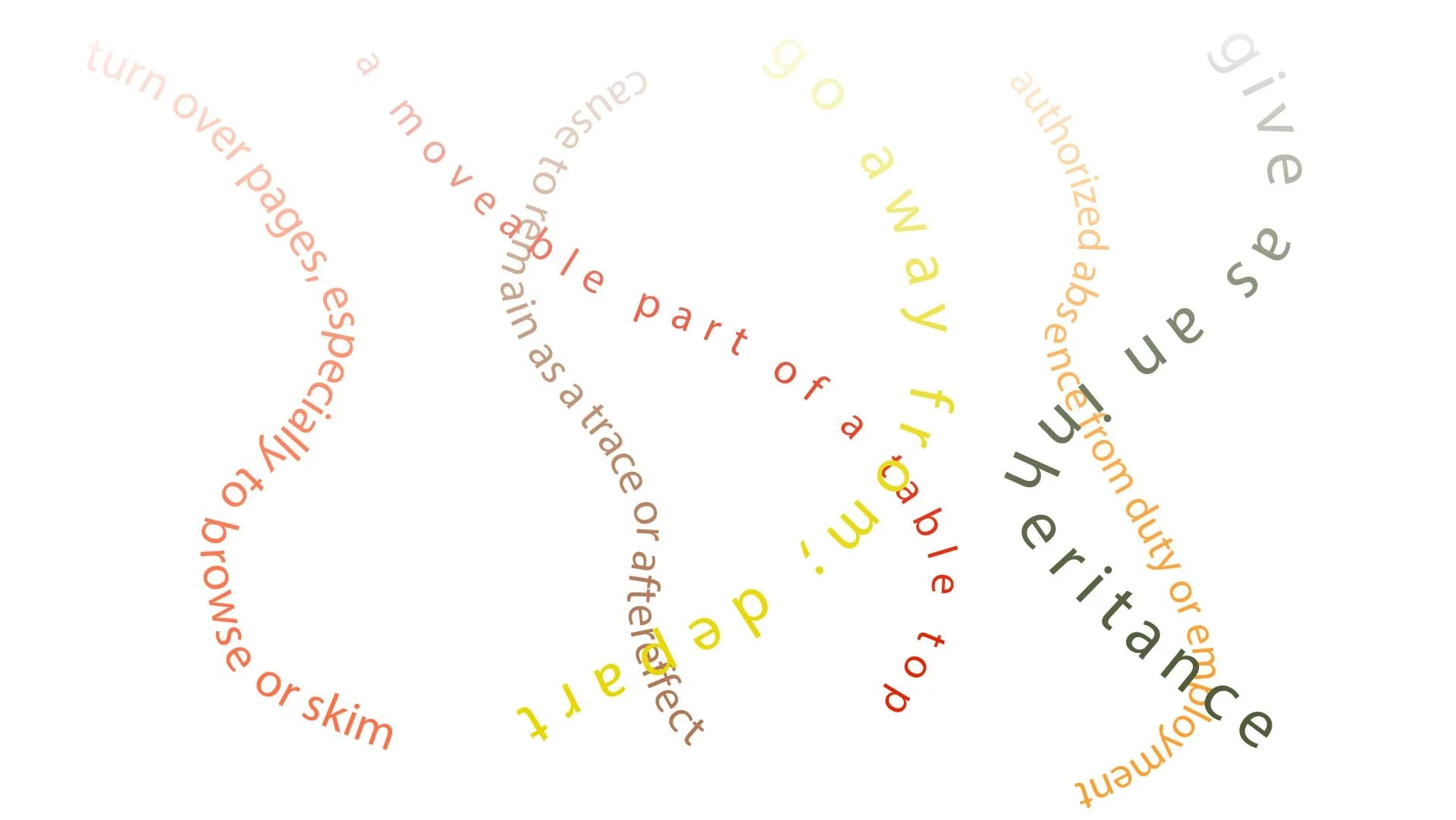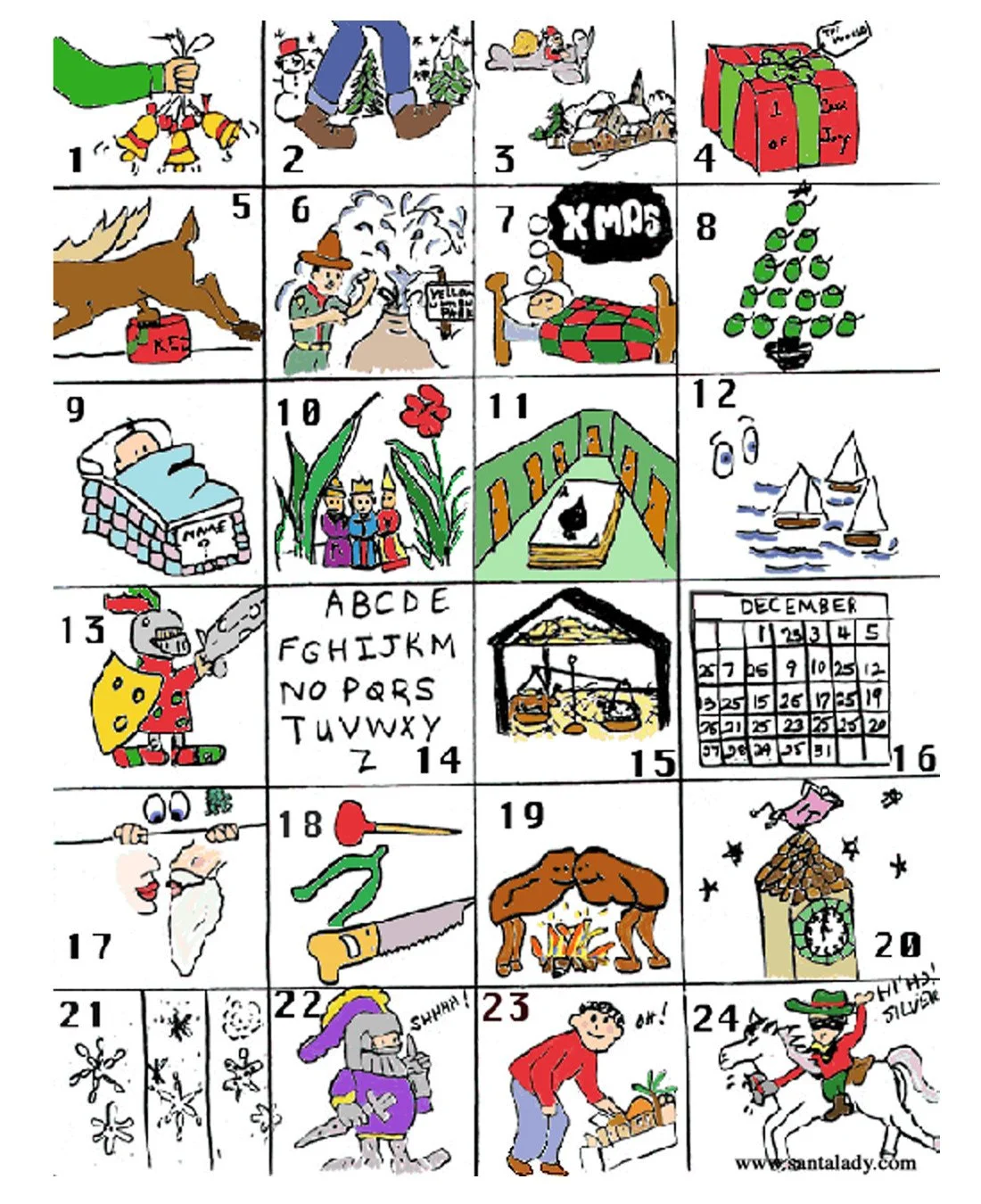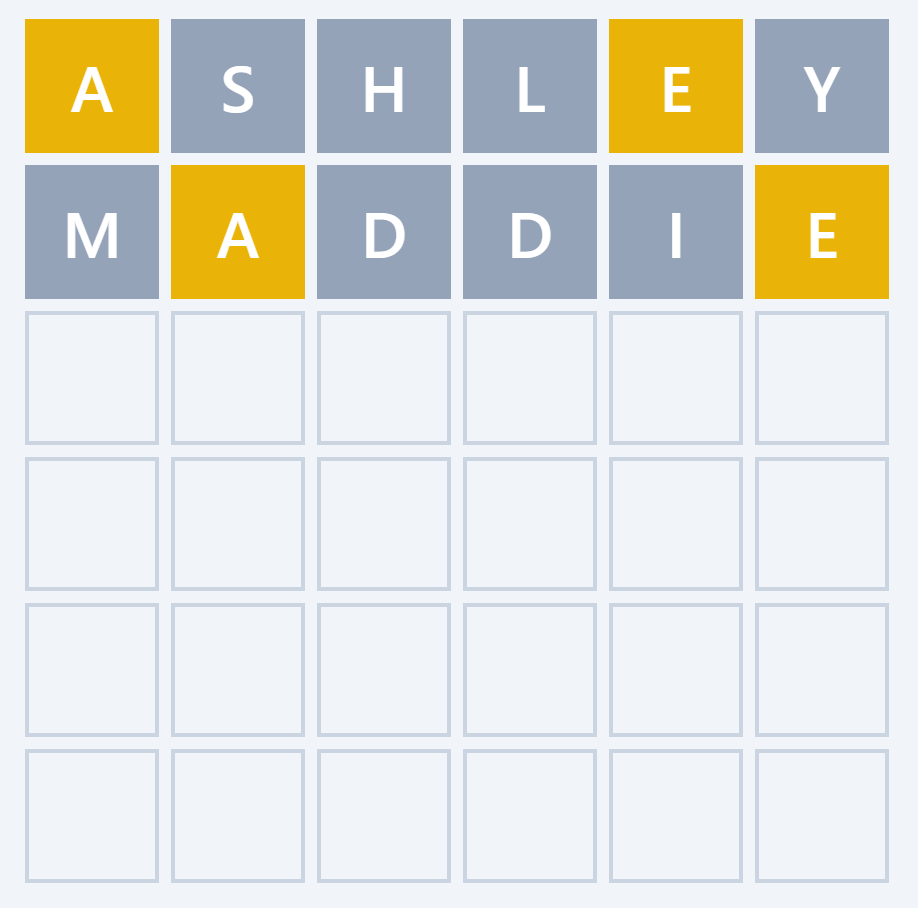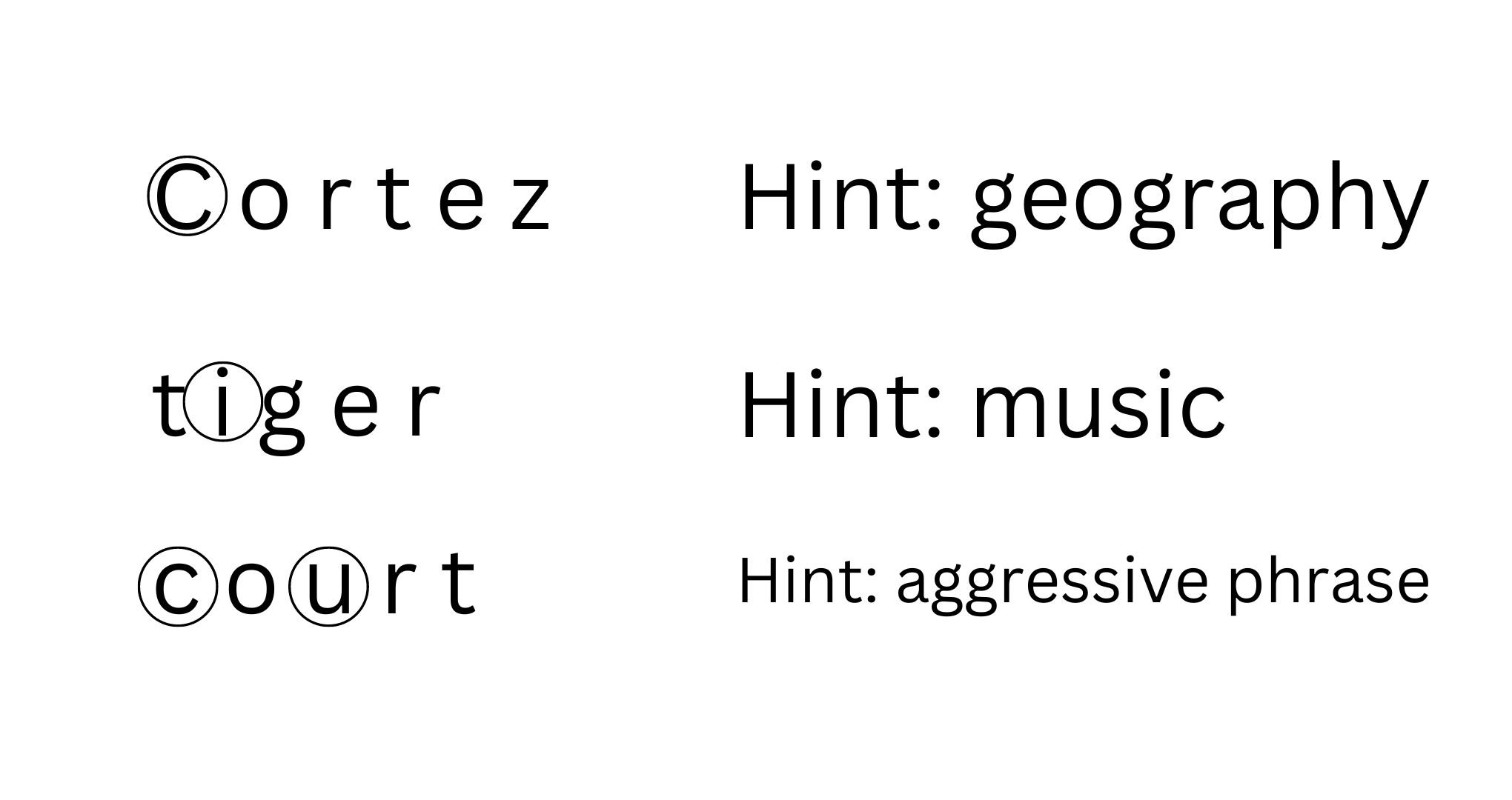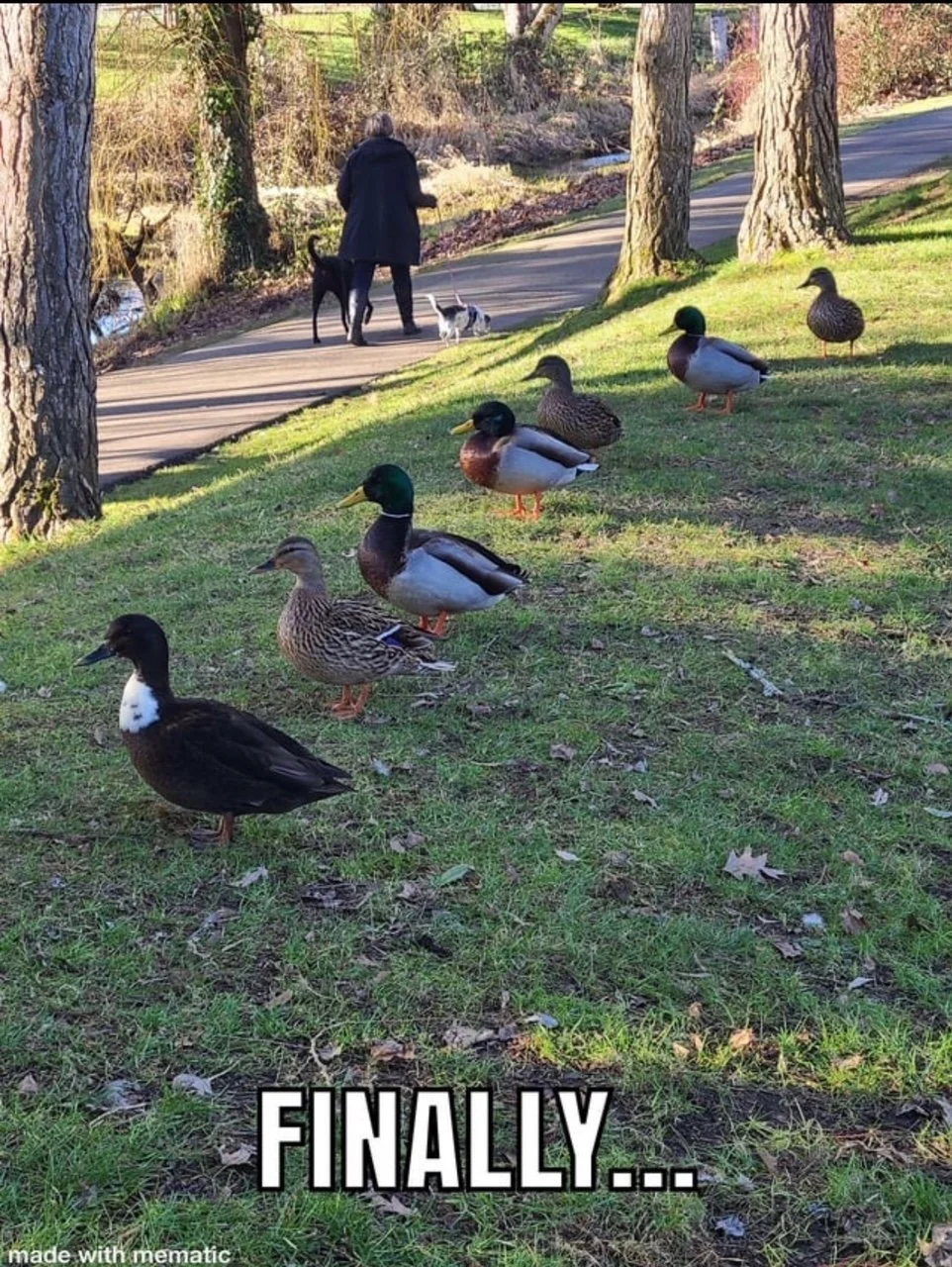
Weekly Wordplay
May 1–5
Accurately complete this mini crossword to earn the extra credit.
May 22–26
One meaning of the world ultimate is “last” as in, “the last one.” For example, e is the ultimate letter of the word ultimate. The word penultimate means the second-to-last of something. So this week is the penultimate week of our school year. I think that penultimate is a fun word that ought to be used more often. Why say “second to last” when you could say “penultimate?”
This can be taken a bit further, so the antepenultimate is the third-to-last of something, the preantepenultimate is the fourth-to-last, and while there are words with for fifth-to-last and so one with increasingly unwieldy amounts of prefixes stuck at the beginning, I doubt they’ve ever been used, except for humor. So preantepenultimate is the ultimate word of this sort that’s in my active vocabulary.
What’s a relatively obscure word that you think more people ought to use? To earn the extra credit, suggest such a word, and explain why you think that word ought to appear more in everyday writing and conversation.
May 15–19
My nine-year-old daughter is named Eden and my five-year-old son is named Canaan—both the names of places in the Bible. My wife and I didn’t plan out that our kids’ names were going to have a “theme,” but when we were considering possibilities for our son’s name, we thought the connection between the two names would be fun. People sometimes ask what Biblical place name we’d use for a hypothetical third child, and I don’t have a settled answer for that.
Some of you may plan to have children at the right time in your life, and some of you may not, but imagine for a moment that you will have three children, and you want their names to connect in some way—to have a “theme.” To earn the extra credit, turn in three connected names you might choose, and explain the theme that connects them.
April 17–21
On the drive ride back from the Sonscreen film festival, I asked whether the other van we’d brought on the trip was a Honda Odyssey. A student made a joke about another Honda model being named the Iliad. I thought this was very clever. You know—literature joke! The two great ancient Greek epic poems written by Homer are the Odyssey and the Iliad.
Companies spend a lot of time—and often a lot of money—to come up with names for their products. Consider the models made by a car manufacturer. For example, the Honda Civic, Accord, and Fit—or the Ford Mustang, Escape, and Bronco. Choose a car manufacturer and come up with an additional model name that would fit with the names of some of their other models. Give the name, and tell how you imagine a vehicle with that name would be different from the other vehicles that manufacturer makes.
April 10–14
A word or phrase that reads the same when it’s spelled forward or backward is a called a palindrome. Examples include “racecar” and “A man, a plan, a canal, Panama!”
But some words, when read backwards, form different words. Sometimes these are called, semordnilap (which is , of course, the word “palindromes” spelled backward). An example would be the word “stressed,” which read backwards spells “desserts.”
Find three interesting semordnilap of at least four letters. It’s certainly possible to find lists of these with a simple Google search, but that would go against the spirit of this weekly wordplay challenge. Find your semordnilap on your own with a pen and paper (or keyboard and word processing program) and your brain.
April 3–7
Back in September, we had a weekly wordplay in which you wrote a haiku about the warm weather. The warm weather is returning!
This time, write a haiku that captures something you enjoy or appreciate about Paradise Adventist Academy.
Though they don’t accurately capture all the nuances of haiku written in their original Japanese, these are guidelines for how they are usually written in English (and the guidelines I want you to follow):
The poem is three lines long.
The first line contains five syllables, the second line contains seven, and the third contains five.
The theme is usually connected with a season or the natural world, but that’s not essential for this haiku.
If you complete this weekly wordplay, be ready to share your haiku aloud next Monday.
March 20–24
The juniors and seniors are in Washington DC, and they’ll be returning late this week.
I wish them an enjoyable TRIP and a safe journey BACK.
Beginning with the word TRIP, change one letter at a time—always forming a valid word each time you change a letter—until you form the word BACK.
Example: DOG to CAT
DOG > DOT > COT > CAT
Note: for the purposes of this challenge a “valid word” will mean any combination of letters for which you can find a preexisting usage example. Acronyms? Sure. Abbreviations? Ok. Unusual slang words? Fine. But if you think I might question whether anyone has ever used a particular combination of letters together before, give me a source.
February 27–March 3
Solve this Wordle-like puzzle and post a screenshot on Google Classroom to earn the extra credit. The answer is the name of a PAA student.
August 22–26
To earn the extra credit, explain what the six odd phrases below have in common and give another phrase that could be added to the list.
GRANOLA RAVEN
LENDING ACORNS
JOINED RINGS
LYCHEE KINGS
CRANKIEST TURBO
DAUNTING NOVEL
August 29–September 2
I’ve been looking through the classroom windows at the wheat, ready for harvest, and that inspired this weekly wordplay.
WHEAT to BREAD word ladder
Beginning with the word WHEAT, change one letter at a time—always forming a valid word each time you change a letter—until you form the word BREAD.
Example: DOG to CAT
DOG > DOT > COT > CAT
Note: for the purposes of this challenge a “valid word” will mean any combination of letters for which you can find a preexisting usage example. Acronyms? Sure. Abbreviations? Ok. Unusual slang words? Fine. But if you think I might question whether anyone has ever used a particular combination of letters together before, give me a source.
September 5–9
It was hot this last weekend, and it’s hot today!
Write a haiku about the warm weather. Though they don’t accurately capture all the nuances of haiku written in their original Japanese, these are guidelines for how they are usually written in English (and the guidelines I want you to follow):
The poem is three lines long.
The first line contains five syllables, the second line contains seven, and the third contains five.
The theme is connected with a season or the natural world. (In this case, the hot season we are experiencing right now.)
If you complete this weekly wordplay, be ready to share your haiku aloud next Monday.
September 12–16
Write a sentence that is no longer than twenty words but contains every letter of the alphabet. You’ll get the extra credit for writing any sentence that makes sense, but you’ll get extra appreciation for writing a sentence that is enjoyable to read and memorable.
September 19–23
Fill in this crossword with all the correct answers to earn the extra credit for this week.
After you fill in the grid correctly with all the correct answers and earn the extra credit, there is an additional metapuzzle to solve, which will lead you to a $100 Barnes & Noble gift card that is hidden somewhere on campus. When you think you’ve found the word that is the answer to the first step, enter it here.
September 26–30
The juniors and seniors are going to go see two Shakespeare plays on Thursday and Friday. Seeing a play performed live is quite a different experience from reading a play.
READ to LIVE word ladder
Beginning with the word READ, change one letter at a time—always forming a valid word each time you change a letter—until you form the word LIVE.
Example: DOG to CAT
DOG > DOT > COT > CAT
Just a reminder: It is very easy to do a Google search for something like “word ladder solver” and find tools that use the power of computers and large databases of words to solve word ladder puzzles almost instantaneously. I trust that you won’t use one of those, since that would go against the spirit of this wordplay challenge.
November 28–December 2
Consider these five words:
hymn
suit
gnaw
hour
listen
They are a hint to the title of a well-known Christmas song. To earn the extra credit, turn in the song’s title.
November 14–18
Each of the images below visually represents the title of a film that won the Academy Award (Oscar) for Best Picture. To earn the extra credit, give the name of the film clued by each image.
2. 3.
4. 5.
November 7–11
English has many, many words for colors. Some of my favorites include amaranthine, azure, and celadon, and cerulean. To earn the extra credit, do some research and learn an interesting word for a color that you did not know before. By next Monday, be ready to tell your classmates about your color word and describe what color it refers to.
October 31–November 4
On one of the bulletin boards in Mr. Goymer’s room, there is a list of anagrams in which the rearranged phrase fits nicely with the original phrase. For example, ELEVEN PLUS TWO can be rearranged to form TWELVE PLUS ONE and ASTRONOMER can be rearranged to MOON STARER. Some times these are called “apt anagrams” or “aptagrams.”
To earn the extra credit, find an anagram of the name of a person in our PAA community that you think is particularly apt—the anagram should connect with who the person is in some way. You may use the person’s first name, first & last name, or their first & middle & last.
This anagramming tool or the many others like it on the internet may be helpful.
October 24–28
In an acrostic poem, the first letters of each line form a word or phrase. Example:
Poems written by this school’s students
Always bring me joy:
Articulate writing expressed with flair.
To earn the extra credit, write an acrostic poem in which the first letter of the lines form the name of a standardized test taken by PAA students, such as the SAT, PSAT, ACT, or MAP.
October 3–7
In each of the photos below taken around the PAA campus, one letter is obscured. Unscramble the obscured letters to form a word. Turn in that word to earn the extra credit.
October 10–15
Accurately complete this word spiral puzzle to earn the extra credit.
October 17–21
To earn the extra credit, figure out what two-word phrase is hinted at by this image. Hint: It is a common sight during this time of year.
December 5–9
When I was seventh grade, one of the Christmas activities we did in school was this sheet of Christmas song puzzles. Each numbered image represents a Christmas song.
It’s still available, all over the internet.
To earn the extra credit, create an image of your own that represents a Christmas song in some wordplay sort of way, as the examples above do. Next Monday, we’ll try to guess what Christmas song your images represent.
January 2–6
There is a website called The Anagram Times. Every day, it shows an actual, recently published news headline and an apt anagram of that headline—a rearrangement of all the letters that make up the headline that restates the headline or comments on it in some clever way.
Examples from Christmas break:
Elon Musk becomes first person ever to lose $200 billion.
Unclaimed luggage piles up at airports following Southwest cancellations
World’s Population Reaches Eight Billion
To earn the extra credit, create a clever anagram of a headline you see this week.
December 12–16
I have had FLU symptoms over the weekend, and I would certainly like them to END!
FLU to END word ladder
Beginning with the word FLU, change one letter at a time—always forming a valid word each time you change a letter—until you form the word END.
Example: DOG to CAT
DOG > DOT > COT > CAT
Just a reminder: It is very easy to do a Google search for something like “word ladder solver” and find tools that use the power of computers and large databases of words to solve word ladder puzzles almost instantaneously. I trust that you won’t use one of those, since that would go against the spirit of this wordplay challenge.
To earn the extra credit, turn in your answer to the word ladder, but also tell me something that makes you feel better when you have flu symptoms—achy muscles, fever, and fatigue.
January 9–13
One aspect of wordplay skill—and the skill of using words effectively in general—is continually looking for and appreciating the memorable and entertaining in the words that are around us all the time.
The yearbook staff is planning to include a page of memorable quotes overheard in the PAA community this year. To encourage everyone to collect memorable quotes and share them with the yearbook staff, the weekly wordplay this week involves contributing to this quote page.
To earn the extra credit, submit a memorable quote from a member of the PAA community here.
Quotes should, of course, be appropriate for printing in the yearbook. They should be widely understandable, even without context; inside jokes won’t work very well. The majority of quotes chosen for use in the yearbook will likely be entertaining and humorous, but feel free to submit profound quotes too.
Examples:
How the chicken strip am I supposed to know? —Ethan S.
I swear, if this happens one more time, I'm going to do absolutely nothing! —Sam
May 8–12
The answer to the Wordle-like puzzle shown below is the name of a PAA student. With only the information given, you can determine the solution. Turn in the answer to earn the extra credit.
January 23–27
Accurately complete this mini crossword to earn the extra credit.
January 16–20
To earn the extra credit, figure out what three words or phrases are clued below.
January 30–February 3
Solve the cryptogram below. Each letter in the original quote has been consistently replaced with another letter of the alphabet. Hint: W = T
WCA YEZN RP DEQJKPPREIKWA KIN FZKDREXP, PYEU WE KIFAZ, KGEXINRIF RI YEMA. CA URYY IEW KYUKVP KDDXPA, IEZ URYY CA CKZGEZ CRP KIFAZ SEZAMAZ; CA NEAP IEW WZAKW XP KP EXZ PRIP NAPAZMA EZ ZAJKV XP KDDEZNRIF WE EXZ RIRHXRWRAP. SEZ KP CRFC KP WCA CAKMAIP KZA KGEMA WCA AKZWC, PE FZAKW RP CRP YEMA SEZ WCEPA UCE SAKZ CRQ; KP SKZ KP WCA AKPW RP SZEQ WCA UAPW, PE SKZ CKP CA ZAQEMAN EXZ WZKIPFZAPPREIP SZEQ XP.
–JPKYQ 103:8-12
February 6–10
Accurately complete this word spiral puzzle to earn the extra credit.
February 13–17
Last week, a friend who knows I enjoy wordplay sent me this image:
It’s a visual representation of an English idiom. Recall that an idiom is a phrase where understanding the individual words doesn’t make the meaning of the whole phrase clear. To “get one’s duck’s in a row” is to become well prepared or organized for something.
To earn the extra credit, create an image or video that illustrates another English idiom.
February 20–24
The New Yorker publishes a trivia game each weekday called Name Drop. Players are given six clues that point to a notable person. The clues are increasingly helpful; the first one gives relatively obscure information about the person, and a player who doesn’t know who the person is after reading the sixth clue likely doesn’t know much about the person in question at all. Try a few recent examples:
To earn the extra credit, write a name drop puzzle of your own. Choose a person that PAA students could be reasonably expected to know about. Write six clues of increasing helpfulness that point to the person. It should be quite impressive for someone to know the person after the first clue, but the sixth should almost give away the answer.
We’ll play the best ones in class next week.
March 6–10
This week is Brain Week, with special speakers and activities each day focusing on brain health.
Research indicates that grappling regularly with word puzzles contributes to a healthy brain. For example, people who solve crosswords regularly can delay the appearance of Alzheimer’s disease symptoms.
To promote brain health (and, of course, to earn some extra credit) solve this word puzzle: Take the phrase “Brain Week” and rearrange the letters to make a new phrase that could refer to a newly arrived passenger in Genesis 7.
March 13–17
I subscribe to three “word-of-the-day” email lists. In addition to a word and its definition, they usually include an explanation of the word’s etymology (the word’s history—the language it came from, how it entered English, and how its meaning has changed over time) and some examples sentences showing how the word is used. Reading these emails is a moment of joy in my day. I learn new words, and I learn more about words I’m already familiar with!
This week is the 29th anniversary of one of those word-a-day emails. “A.Word.A.Day” has been sent out daily to subscribers for 29 years. To celebrate, they’re running a contest. If you send alternative definitions of precisely 29 letters for each of the five Monday–Friday words to words@wordsmith.org, you could win a signed book or a wordgame. For example, today’s word is “aderation,” which means “the act of giving a monetary value to something.” An alternative 29-letter definition would be “assigning cash value to something.”
You can subscribe or just see what’s sent out in each day’s email here: https://wordsmith.org/words/today.html
To earn the extra credit, email in your five 29-letter definitions (one for each day of this school week), and paste the text of your email into the Google classroom assignment.
April 24–28
An aptonym or aptronym (from the word apt meaining “suitable” or “appropriate” and -nym, a greek suffix meaning “name”—think of words like synonym and acronym) is a name that seems particularly suited to the person who bears it. Here are some examples:
William Wordsworth—English poet (who also advocated for stronger copyright laws)
Usain Bolt—Jamaican sprinter
Sue Yoo—an attorney in New York City
To earn the extra credit, think up an aptonym and describe the sort of person for whom it would be particularly apt.
A Google search will reveal many lists of aptonyms—both names of real people and humorous made up ones—but don’t look at these until after you’ve come up with your own using your own clever brain.











